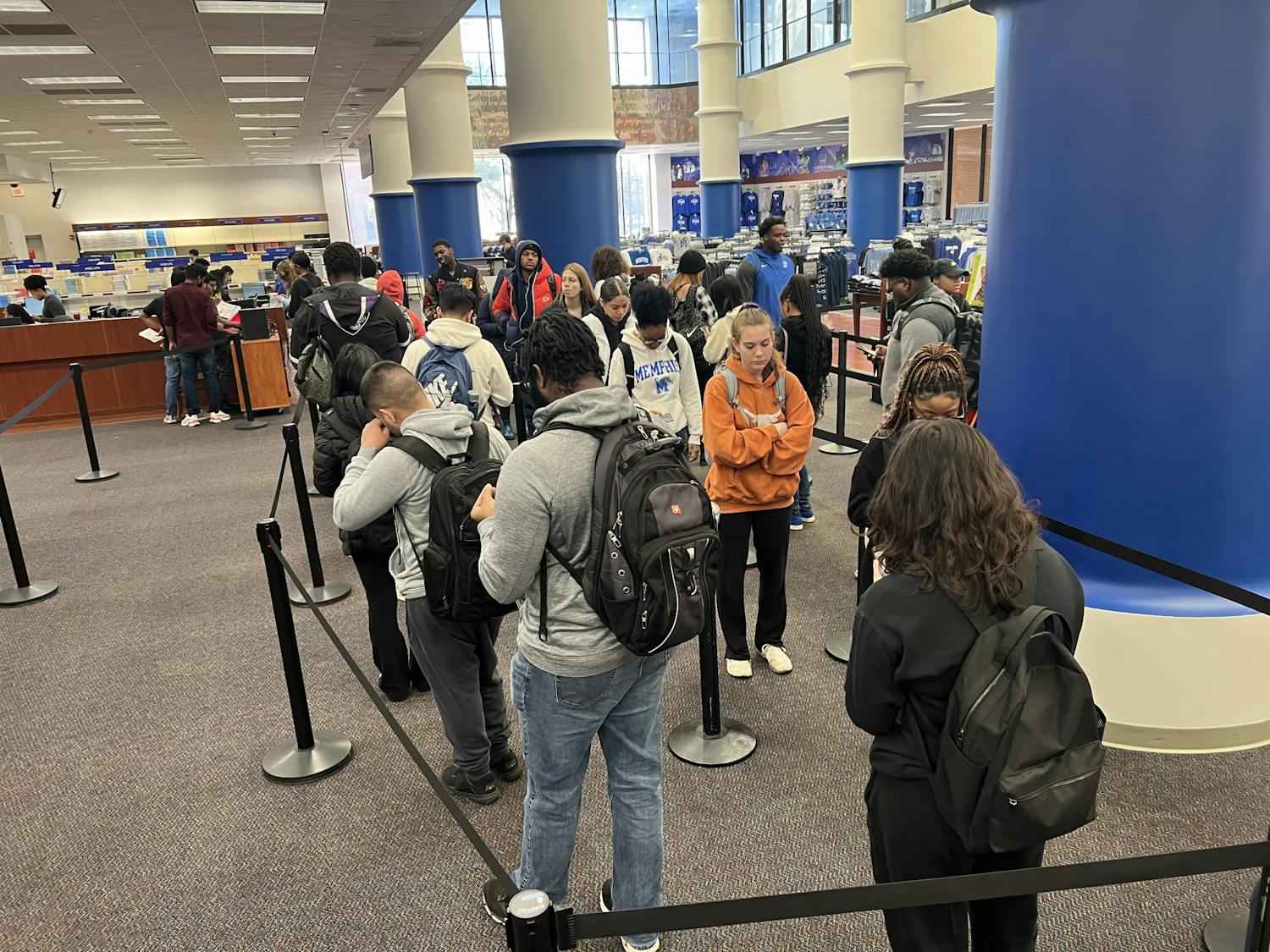Growing up with autism spectrum disorder can be difficult, and for many students with autism at the University of Memphis, adjusting to college life can be a big challenge.
A child diagnosed with autism spectrum disorder can often be bullied in school because of a lack of social skills, and college can bring an entirely new set of challenges for them. Leaving family behind is difficult for most students living away from home for the first time, but students with autism face new problems, including coexisting with their fellow students, living with new people in a dorm, and the entirely new class format offered at universities.
The University of Memphis has a Disability Resources for Students office (DRS), which ensures that it coordinates and provides appropriate aids and services so that students with disabilities have the same opportunities as others. People within the spectrum can also access this service.
Contrary to what one might think, a person with autism usually has no problems with the class material.
"For the most part, the students can even be gifted; they are usually very intelligent," said Tara Buchannan, director of Disability Resources for Students. Buchannan said that all students who meet the admissions qualifications and services through their office are qualified to be at the university and are well suited for a university setting in many ways. "A lot of times, teachers in schools or colleges actually have autism spectrum disorder. And the reason why that job is so well suited is that people on the spectrum tend to focus on a particular topic of interest. They love to talk about it," Open-ended questions can be a challenge for them because they are more subjective. That's why majors in science, math, or physics are often the choices for students on the spectrum, "it's because those are black and white answers," said Buchannan.
Students with ASD may have comorbid conditions, such as Attention-deficit/hyperactivity disorder (AD/HD), obsessive-compulsive disorder (OCD), generalized anxiety disorder or issues with fine motor skills. As a result, these students may be eligible for accommodations like extended time for tests, taking tests in a low stimulus environment, or using a computer to type the answers to essay questions instead of writing their answers in a blue book.
When they meet a student on the spectrum that might have misunderstandings with their teachers because of their lack proficiency in social nuance, DRS often advises them to write a letter of introduction. In that letter, they tell the teachers about their condition and future behaviors that they may have.
"Some students can be rude; they just don't know they're being rude because that's not something that makes sense to them in their brain," Buchannan said. "Not all students on the spectrum struggle with this issue."
Buchannan said that teachers are often very receptive and understand that they may need to communicate differently with them. They also can keep their course standards the same. "That's not something we do for any student with a disability; we cannot modify any essential elements of a course," Buchannan said.
Douglas Stevenson is one of the students on the spectrum that Buchannan works with. He is a computer engineering sophomore who dreams of creating his own business. Stevenson said experience with teachers has been mostly good.
"Most of them make a really good effort to cater to some of my needs, like extra time or a quiet place to test taking," he said.
They may be academically well-suited, but the social part of navigating the environment can be complicated for students on the spectrum. Buchannan said that they might accommodate them in the residence hall, like giving them a single room or a preferred roommate. Stevenson lives in the apartments with three roommates. His family is only 30 minutes away, but he decided to live on campus to get the full college experience. "It's kind of hard, dealing with them sometimes, especially because I'm sort of a clean freak and I like to keep stuff overly sanitized, and I sometimes freak out," Stevenson said, "not at them, but just in general."
For Mackenzie Heidelberg, a freshman with an undecided major on the spectrum, it was an "adjustment from home."
Making friends can often be difficult. Stevenson said that although he is in the marching band and fits into a group of friends, it's really challenging to talk to them because he either gets nervous, scared or doesn't know what to say.
"It's not as hard as when I was eight years old, but it's still challenging to be able to even talk to them over the phone or pick up on those social cues that they give in some acronyms and stuff that I don't even understand," he said.
Heidelberg has always had difficulties communicating with people her age, and said she understands adults better. "Sometimes I go alone, and I would go to my room and not go out and talk to people. The only friend I made already is my roommate," she said.
Another student, who wished to remain anonymous, came from a home-school background, so it was hard initially for her. "I used to cry every single day. It is gotten a lot better, although some days are worse than others, to go to class, do group work or make friends," she said.
Added to this, people with autism often overthink everything. "I don't have a filter, and I will say something that I deeply regret, but I don't know until that person reacts,” Stevenson said. “And for the next week, I'll overthink and then probably communicate with them hesitantly to ask, ‘are you mad at me?’ And, of course, they say they're fine. But in the back of your head, you try to think, are they really, okay? Will they still be friends with you?"
Sometimes understanding sarcasm is not easy either. Stevenson explains that it is not as bad as a decade ago, but even now, with few of his friends, he wonders if they mean what they said or if they were playing around. The anonymous student said that a lot of her friends and coworkers use a lot of sarcasm, and it's something that she has had to pick up on a lot. "You start to learn people's sarcasm, I believe, as you get to know the person. But sometimes, even then, you’re kind of side eyeing them a little bit," she said.
Another resource that the University of Memphis has is the ABA center. ABA (applied behavior analysis) is a therapy that is said help people on the spectrum understand how behavior works, and increase communication skills. However, the anonymous student compares the therapy to training a dog. When he does something well, you reward him; when he doesn't, you punish him. She explained that ABA could be harmful in the long run because it can promote masking.
Masking is putting on an outer layer that you present to the world, so you can "fit in better," which can lead to extreme burnout. "It may also feel like you're losing a sense of self because you act one way in private and then you have this drastically different appearance in public," explained the anonymous student.
Buchannan, comments that, in general, most people mask to a certain degree. Still, it can be extremely emotionally exhausting for people on the spectrum. For them, they may feel they have to mask 24/7.
"I always feel like someone's watching. I never get a break. I always feel like I'm wearing a mask. I am constantly in a professional mode unless I know it's like really late at night and I'm completely alone," said the anonymous student.
Stevenson explained that he has learned that he shouldn't mask who he is. "Even though in some ways it can be beneficial, like you can fit in, but on the inside, you don't really feel like this is right, and you just go off of other people," he said. Heidelberg only takes off her mask when she is with her family.
You probably won't identify a person with autism at first glance. Stevenson's girlfriend didn't believe him at first. "I only tell my closest friends that I have autism because, for me, it is a privacy thing because I don't know what people are going to do," he said.
In general, the University of Memphis has a good team of professionals who help students on the spectrum every day. However, Stevenson mentioned that he would like to have a counselor who specializes in autism spectrum disorder so he has someone he can talk to. Like many other disabilities, people, in general, may be unaware of what autism really is and may have prejudices. For this reason, if we meet someone on the spectrum, it is important to be interested in that person and inform yourself.






